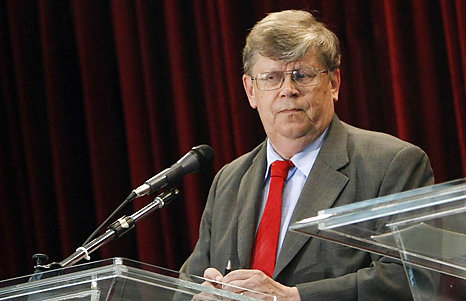Economic benefits foreseen in INSTEX will not meet requirements of Iran: Heinonen

TEHRAN - Olli Heinonen, the former deputy director general for safeguards at the International Atomic Energy Agency (IAEA), tells the Tehran Times that “It appears at this stage that the economic benefits foreseen in INSTEX are at best limited and will not meet the requirements of Iran.”
Heinonen, now a senior advisor on science and non-proliferation at Foundation for Defense of Democracies, also believes that “European partners will certainly do their best to maintain the JCPOA.”
“Iran is technically in good position to ramp-up in a short period of time its uranium enrichment capacity,” director general for safeguards at the IAEA tells to the Tehran Times.
Following is the text of the interview with Heinonen:
Q: Iran has announced that it will implement a third step to reduce its obligations under the JCPOA. Will Europe takes effective and convincing action to prevent this?
A: First, we need to recognize that Iran is technically in good position to ramp-up in a short period of time its uranium enrichment capacity. There are over ten thousand gas centrifuges of various types, cascade piping and necessary feed and withdrawal systems, and required electronic control systems ready for installation. These can be configured to enrich uranium to various levels. Though the important calandria has been destroyed as required by the JCPOA, no major changes have yet been done to the reactor core. Therefore, one can use the existing design drawings to manufacture necessary components in domestic workshops.
European partners will certainly do their best to maintain the JCPOA, but any reduction of obligations by Iran will raise questions about the value and credibility of the JCPOA in its current form. It appears at this stage that the economic benefits foreseen in INSTEX are at best limited and will not meet the requirements of Iran.
Q: What would be the possible reaction of Russia and China to reducing Iran's commitments under JCPOA?
A: As parties to the JCPOA and permanent members of the UN Security Council, they have a say, but they are not likely to be able to provide the economic benefits Iran is seeking.
Q: In your opinion, will the third phase of reducing Iran's commitments in the JCPOA be dangerous? Will Iran's case go to the United Nations Security Council after third step of reducing its commitments?
A: There are three avenues to have the UN Security Council engaged. One option is just go directly to the UN Security Council, and a second is the route of invoking the conflict resolution process of the JCPOA. At this stage, depending on the reduction of commitments by Iran, both of them are difficult. A third option is an IAEA resolution on Iran’s non-compliance under the safeguards agreement. The atomic archives found in Teheran strongly indicate that Iran could be in breach of its obligations in declaring facilities designed and constructed for nuclear weapon related purposes in early 2000’s, which should have been included in the declarations made to the IAEA.
Q: Can the United States impose new sanctions on Iran after the third step in reducing Iran's commitments under JCPOA?
A: The United States has already shown its preparedness to impose strong sanctions and additional sanctions will likely be imposed unilaterally. But the fact that the original implementation parameters will be substantially compromised with Iran’s reduction of its commitments, one can also expect the U.S. to seek international support in its actions, for example through the UN Security Council.
The only way out from the stalemate is, in my view, a new/improved agreement, which will address the deficiencies of the JCPOA. Every day spent in saying that the JCPOA cannot be amended, is a day wasted.
Leave a Comment